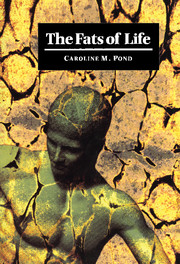Prologue
Published online by Cambridge University Press: 18 January 2010
Summary
For much of this century, fats have suffered from bad press. ‘Trim away the fat’, ‘fat and flabby’ reflect the prevailing view that anything fatty is at best superfluous or ugly, often indicative of an indolent or intemperate lifestyle, and sometimes positively harmful. The implication of fats in causing common forms of heart disease was entirely in keeping with this view. Scientists explained how fats accumulated surreptitiously, gradually slowing life's traffic until the blockages they cause strangle it. Even more distressing is the fact that fats cannot easily be expelled by drugs, radiation, massage or even surgery; they are purged only by continual exertion and abstinence. More than any other biological materials, except perhaps genes, fats and fatness have acquired a moral dimension. Fats were seen as literally the agents of just retribution for the modern lifestyle, turning self-indulgence and sloth into debility and death.
Biochemists have been slow to undermine this attitude. They have understood the importance of proteins in living systems for more than 100 years. By the middle of the twentieth century, proteins were established as the primary gene product, and techniques for probing their internal structure and quantifying their activities were advancing rapidly. A score of different subunits can be assembled into thousands of different protein molecules, many of them precisely tailored to highly specific roles. The absence, misplacement or substitution of one crucial subunit can wreck a whole molecule. Similar structural variety in sugars and starches was also established in the nineteenth century, and it acquired new importance when the role of such molecules in cell adhesion and molecular recognition was identified in the 1960s.
- Type
- Chapter
- Information
- The Fats of Life , pp. 1 - 4Publisher: Cambridge University PressPrint publication year: 1998



